Monthly Archives: September 2018
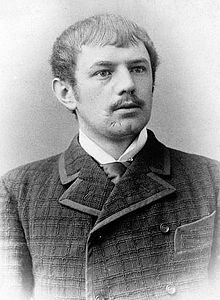 Hitler was undoubtedly one of the most horrible dictators of all time, but what prompted him to become the evil man he was. The story actually begins before Hitler was even born. In 1868, a baby named Dietrich Eckart was born in Neumarkt, Germany, on March 23, the son of a royal notary and law counselor. My guess is that he had a fairly normal childhood…at least until his mother died when he was just ten years old. That may not seem like an event that was unique to Eckart, but somehow it was different, or would become different. Eckart’s life was further complicated when his father died seventeen years later in 1895. At this point, Eckart inherited a considerable sum of money, and started to study medicine in Munich. That would be the last of his somewhat normal life. He spent his father’s money very quickly, and recklessly.
Hitler was undoubtedly one of the most horrible dictators of all time, but what prompted him to become the evil man he was. The story actually begins before Hitler was even born. In 1868, a baby named Dietrich Eckart was born in Neumarkt, Germany, on March 23, the son of a royal notary and law counselor. My guess is that he had a fairly normal childhood…at least until his mother died when he was just ten years old. That may not seem like an event that was unique to Eckart, but somehow it was different, or would become different. Eckart’s life was further complicated when his father died seventeen years later in 1895. At this point, Eckart inherited a considerable sum of money, and started to study medicine in Munich. That would be the last of his somewhat normal life. He spent his father’s money very quickly, and recklessly.
With his money gone, Eckart quit school, and began work as a poet, playwright, and journalist. He moved to Berlin in 1899, where he wrote a number of plays, often with autobiographical traits. Apparently, he was about the only one interested in his plays, because despite becoming the protegé of Graf Georg von Hülsen-Haeseler, the artistic director of the royal theaters, he never was successful as a playwright. Taking his madness one step further, he blamed his failure on society. This was the beginning of the insanity that became Dietrich Eckart. Later on, Eckart developed an ideology of a “genius higher human,” after reading earlier writings by Lanz von Liebenfels. Eckart saw himself like Arthur Schopenhauer and Angelus Silesius, and also became fascinated by Mayan beliefs, but never had much sympathy for the scientific method. That makes sense, because he seemed to want to make up his own truths. Eckart also loved and strongly identified with Henrik Ibsen’s Peer Gynt.
In 1913, when he moved back to Munich, he joined up with Rudolf von Sebottendorff’s right wing Thule Society, and became very politically active. He wrote the nationalist play “Heinrich der Hohenstaufe” (“Heinrich of the High Baptism”), in which he made the claim to world leadership for the German people, craziness that he would eventually pass along to Hitler. Soon he became the editor of the anti-semetic periodical Auf gut Deutsch. Eckart opposed the Treaty of Versailles, which he described as treasonous, and instead spread the so-called Dolchstoßlegende, which stated that the social democrats and Jews were to blame for Germany’s defeat in World War I. He was involved in the founding Deutsche Arbeiterpartei (German Workers’ Party) together with Gottfried Feder and Anton Drexler in 1919, which later on was renamed Nationalsozialistische deutsche Arbeiterpartei (National Socialist German Workers’ Party, NSDAP). He invented and published the NSDAP’s own periodical Völkischer Beobachter, and also wrote the songtext “Deutschland erwache” (Germany awake), which became the anthem of the Nazi party.
Adolf Hitler was born April 20, 1889, just a few years before Eckart’s dad’s passing. During a speech he gave before party members on August 14 1919, Eckart met Adolf Hitler. He exerted considerable influence on Hitler in the following years. Hitler looked at him as his “fatherly friend.” On November 9 1923, Eckart was involved in 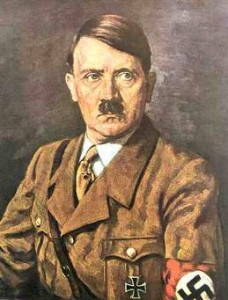 the Nazi party’s failed Beer Hall Putsch,as was Hitler. They were arrested and sent to Landsberg prison along with other party officials, but he was released again soon due to illness. He died of a heart attack caused by a morphine addiction in Berchtesgaden on December 26, 1923. Hitler later dedicated the first volume of Mein Kampf to Eckart, and also named the Waldbühne in Berlin “Dietrich-Eckart-Bühne” when it was first opened for the 1936 Summer Olympics. In 1925, Eckarts unfinished essay, Der Bolschewismus von Moses bis Lenin. Zwiegespräch zwischen Hitler und mir (“Bolshevism from Moses to Lenin. Dialogues between Hitler and me”), was posthumously published, although it has been shown that it the dialogues were an invention. The essay was, in fact, written by Eckart alone. I don’t know what Hitler would have been like had e not met Eckart. My guess is that the evil ideas Hitler had were there before their meeting, but I do believe that Eckart had a great influence on Hitler,and probably helped formulate some of the evil that was to come.
the Nazi party’s failed Beer Hall Putsch,as was Hitler. They were arrested and sent to Landsberg prison along with other party officials, but he was released again soon due to illness. He died of a heart attack caused by a morphine addiction in Berchtesgaden on December 26, 1923. Hitler later dedicated the first volume of Mein Kampf to Eckart, and also named the Waldbühne in Berlin “Dietrich-Eckart-Bühne” when it was first opened for the 1936 Summer Olympics. In 1925, Eckarts unfinished essay, Der Bolschewismus von Moses bis Lenin. Zwiegespräch zwischen Hitler und mir (“Bolshevism from Moses to Lenin. Dialogues between Hitler and me”), was posthumously published, although it has been shown that it the dialogues were an invention. The essay was, in fact, written by Eckart alone. I don’t know what Hitler would have been like had e not met Eckart. My guess is that the evil ideas Hitler had were there before their meeting, but I do believe that Eckart had a great influence on Hitler,and probably helped formulate some of the evil that was to come.

 Today, September 9, 2018, my grandson, Josh Petersen, the last teenager in our family, turned 20. It is very strange to think about the fact that we have no teenagers. The teenage years have been a big part of our family for so many years…9 to be exact. I know that many families have teenagers for a lot longer, but then all four of my grandchildren arrived within 2½ years…from first to last. So, now we begin a new era. One where our grandchildren are adults, and have or soon will begin families of their own. It’s a strange thing when your family goes from one era to the next, but then, you get used to it, and you go on…like we will now. Life is a process that you just cant slow down, no matter how much you would like to.
Today, September 9, 2018, my grandson, Josh Petersen, the last teenager in our family, turned 20. It is very strange to think about the fact that we have no teenagers. The teenage years have been a big part of our family for so many years…9 to be exact. I know that many families have teenagers for a lot longer, but then all four of my grandchildren arrived within 2½ years…from first to last. So, now we begin a new era. One where our grandchildren are adults, and have or soon will begin families of their own. It’s a strange thing when your family goes from one era to the next, but then, you get used to it, and you go on…like we will now. Life is a process that you just cant slow down, no matter how much you would like to.
In reality, Josh has seemed older than his years for a while now. He has been taking college classes since he was a kid in high school, and already has his associates degree in Fire Science. He has a year of full time college behind him now,and has started the Paramedic program this year. I am so proud of how far he has gone. He came from a beginning that was 5 weeks before he should have arrived, to spending 2½ weeks in Denver’s Presbyterian Saint Luke’s neo-natal intensive care unit; to growing like a weed; to helping with caregiving from his great grandparents for 13 years; and now, to studying for his own career in fire science and paramedics. I have always felt Josh would be perfect in this type of career, because he has a caregiver’s heart and is meticulous in the things that needed done. If you told him howto do something, he did it…just exactly as you said…no improvising. We always knew we could trust him, and trust is a big thing in the world of caregiving. People are entrusting you with their lives.
Josh is a kind and loving young man, with a strong sense of integrity. He is not one to lie to you. Oh, I’m not saying that he has never told a lie…we have all done that, but he doesn’t make a habit of it. When he tells me something, I believe him. Josh tries to do his best in everything he does, and I really respect that. As he 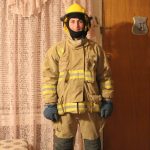
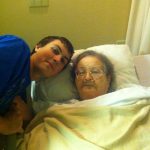 transitions from a boy to a man, I feel a great sense of pride in the man he is becoming, and I know that he will go far in his chosen career, and in life. The things he is doing are so perfect for his personality, and that makes me very happy. And, it makes me happy that he is having so much fun doing it. As the old saying goes, “Choose a job you love, and you will never have to work a day in your life.” That is what Josh has done, and I am very proud of him, and very proud of the firefighter he will one day be. Today is Josh’s 20th birthday. Happy birthday Josh!! Have a great day!! We love you!!
transitions from a boy to a man, I feel a great sense of pride in the man he is becoming, and I know that he will go far in his chosen career, and in life. The things he is doing are so perfect for his personality, and that makes me very happy. And, it makes me happy that he is having so much fun doing it. As the old saying goes, “Choose a job you love, and you will never have to work a day in your life.” That is what Josh has done, and I am very proud of him, and very proud of the firefighter he will one day be. Today is Josh’s 20th birthday. Happy birthday Josh!! Have a great day!! We love you!!
 Most airplane malfunctions leave the captain and flight crew able to at least attempt a somewhat controlled crash landing, but that was not the case with USAir Flight 427. One minute, everything was going perfectly, and the next, the plane had flipped over and was plummeting toward the ground, nose first. The pilot, Captain Peter Germano had been sipping a cranberry-orange juice and Diet Sprite drink 10 minutes before the crash, and then gave the cabin a standard weather report for Pittsburgh less than three minutes before the plane went down. It was a smooth flight all the way, and there were no anticipated problems.
Most airplane malfunctions leave the captain and flight crew able to at least attempt a somewhat controlled crash landing, but that was not the case with USAir Flight 427. One minute, everything was going perfectly, and the next, the plane had flipped over and was plummeting toward the ground, nose first. The pilot, Captain Peter Germano had been sipping a cranberry-orange juice and Diet Sprite drink 10 minutes before the crash, and then gave the cabin a standard weather report for Pittsburgh less than three minutes before the plane went down. It was a smooth flight all the way, and there were no anticipated problems.
The pilots had no warning. Just 28 seconds before the crash, the pilots’ desperate exclamations are heard as the wings begin to shake and cockpit alarms sound. Germano says, “Sheez,” on the heels of three electrical clicks just before 7:03pm The Boeing 737-300 rolled to the left and dives. Germano breathes heavily and says, “Whoa,” as a thump and some clicking is heard. Another click is heard and Germano says, “Hang on.” The captain screamed and the co-pilot said, “God . . . no!” as a USAir jet spun out of control and dove about a mile nose first to the ground, killing all 132 people aboard. The flight had been completely normal until the last 28 seconds. There was no time to fix anything, and they didn’t know what to fix anyway.
“There is no indication that there was a criminal act involved in the crash,” one of the investigators said. There  was no explosion. They began to look at things like turbulence on the Boeing 737-300…to whether the pilots had been properly trained to recover from trouble in the air. Among the areas of the plane to be examined was the possibility of a rudder malfunction. USAir has warned pilots of its Boeing 737s to watch out for spontaneous rudder movements during flights. The rudder is a large vertical tail slab that moves a plane left or right.
was no explosion. They began to look at things like turbulence on the Boeing 737-300…to whether the pilots had been properly trained to recover from trouble in the air. Among the areas of the plane to be examined was the possibility of a rudder malfunction. USAir has warned pilots of its Boeing 737s to watch out for spontaneous rudder movements during flights. The rudder is a large vertical tail slab that moves a plane left or right.
After USAir Flight 427, a Boeing 737-300, crashed outside Pittsburgh on September 8, 1994, Boeing claimed the crash, which killed all 132 people on board, was caused by pilot error. The pilots’ union claimed the Boeing 737 was defective. A series of clues unearthed through meticulous detective work pointed to a problem in that prior Flight 427’s power control unit, which is a hydraulic device that controls the movement of the rudder. Investigators zeroed in on a suspicious servo valve in the power control unit. One of the manufacturers recalled a failed test, in which, for a second or two the valve stuck. The test was called thermal shock, and involved injecting hot hydraulic fluid into a valve that had been frozen to -40° to simulate the temperature in flight to the worst case scenario. At one point, the test failed, and then after the valve was adjusted, it passed. With the valve-in-a-valve system in the 737, it was expected that if the outer vale failed, the inner valve would compensate for the failure by injecting more fluid to bring the rudder back to the neutral position.
But as an analyst named Kitka studied the squiggly lines for the return flow now, he saw dips that were not 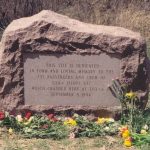 supposed to be there. When he matched them to another graph showing the force on the levers inside the PCU, he made an alarming discovery. When the outer valve had jammed, the inner valve had moved too far to compensate. That meant the rudder would not have returned to neutral, the way it was supposed to. The rudder would have reversed. That could be catastrophic, and in fact, it was. A pilot would push on the left pedal, expecting the rudder to go left, but it would go right, causing the plane to flip over and nosedive into the ground in a matter of seconds, with no possible fix on the part of the pilot and crew. There simply wasn’t enough time to fix the problem, and no way to do so anyway. Of course, the planes were grounded until they were fixed, but for the passengers and crew of USAir Flight 427, it was too late.
supposed to be there. When he matched them to another graph showing the force on the levers inside the PCU, he made an alarming discovery. When the outer valve had jammed, the inner valve had moved too far to compensate. That meant the rudder would not have returned to neutral, the way it was supposed to. The rudder would have reversed. That could be catastrophic, and in fact, it was. A pilot would push on the left pedal, expecting the rudder to go left, but it would go right, causing the plane to flip over and nosedive into the ground in a matter of seconds, with no possible fix on the part of the pilot and crew. There simply wasn’t enough time to fix the problem, and no way to do so anyway. Of course, the planes were grounded until they were fixed, but for the passengers and crew of USAir Flight 427, it was too late.
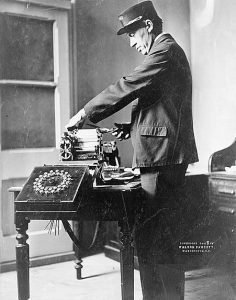 One of the more primitive forms of communication in modern times, was the telegraph. Most of us think of the wild west, and the lone operator sitting in his little office, tapping away on his little telegraph machine. We are also kind of interested in the whole thing, because he was able to write in a language the rest of us do not know, unless we are trained in Morse Code. And most of us think that with modern forms of communication, the telegraph has long been gone from history, but that isn’t so…at least not until January 27, 2006. That was the day when Western Union sent its final telegram. For many, at least for history lovers, that was a sad day. The end of another era. Gone forever.
One of the more primitive forms of communication in modern times, was the telegraph. Most of us think of the wild west, and the lone operator sitting in his little office, tapping away on his little telegraph machine. We are also kind of interested in the whole thing, because he was able to write in a language the rest of us do not know, unless we are trained in Morse Code. And most of us think that with modern forms of communication, the telegraph has long been gone from history, but that isn’t so…at least not until January 27, 2006. That was the day when Western Union sent its final telegram. For many, at least for history lovers, that was a sad day. The end of another era. Gone forever.
While it is a sad day, we must move forward. Technology was rapidly advancing, and we couldn’t drag our feet. In the time it took to prepare a message, go to the telegraph office, take care of the business of payment, have the message sent, and then wait for it to be delivered, we could have made dozens of phone calls of our cell phones. The telegraph was simply a waste of our precious time. So, after 145 years, telegrams were simply gone…no fanfare, no “retirement” party, nothing…just gone. Nothing, but a small announcement on Western Union’s  website prior to the ending. It’s like somehow, such a vital form of communication for 145 years…meant nothing at all.
website prior to the ending. It’s like somehow, such a vital form of communication for 145 years…meant nothing at all.
I’m sure that many people really don’t see why the end of the telegraph was so significant, but for me, there is a nostalgic side to it. I love history, and I am amazed at the innovation of mankind. Over the centuries many amazing inventions have come about, and many discoveries too. Humans really do have a rich history, and when apart of it is over, it is somewhat sad to me. When something that was a mainstay of our society, and just like that, it’s gone, It’s as if we have punished the technology that got us to the place we are. The telegram was just that. For many years, messages from far away…of joy and of sorrow, came to us by telegraph. And in small towns, the person delivering the message knew what it said before the receiver, because he had written it up when it came in.
We all know that Samuel Morse invented the telegraph, and then had to sell the idea, before he could get the 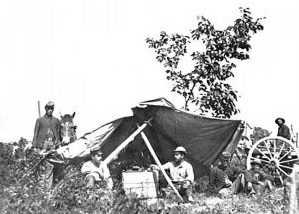 money to build what was only a dream in his head before that. Nevertheless, after showing what his machine could do, Samuel Morse was given $30,000 to build his line. The dream became a reality that would continue for 145 years. More than a year later, the first message was sent on May 24, 1844 and the country was convinced. In a partnership with several other men, Morse began the building of more and more lines, expanding the availability of the new-fangled invention. Eventually, they even had field telegraph office. I’m sure it all seemed impossible, but once Morse proved his machine, everyone was on board…at least until the next new thing came alone. That’s typical, but for the telegraph, the next big thing was a ways down the road.
money to build what was only a dream in his head before that. Nevertheless, after showing what his machine could do, Samuel Morse was given $30,000 to build his line. The dream became a reality that would continue for 145 years. More than a year later, the first message was sent on May 24, 1844 and the country was convinced. In a partnership with several other men, Morse began the building of more and more lines, expanding the availability of the new-fangled invention. Eventually, they even had field telegraph office. I’m sure it all seemed impossible, but once Morse proved his machine, everyone was on board…at least until the next new thing came alone. That’s typical, but for the telegraph, the next big thing was a ways down the road.
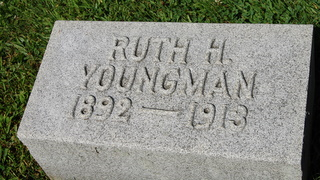 The headline read “Wedding Gown To Be Her Shroud.” The newspaper article was about a horrible tragedy, that took place just four days after the wedding of my husband, Bob’s 6th cousin 3 times removed, Ruth Schulenberg to Wilberd Youngman. The wedding took place on November 26, 1913, and was a large social affair for the smaller town of Tolono, Illinois, population of about 700, at the time. Ruth Schulenberg, was the daughter of Mr and Mrs Henry Schulenberg, and was a graduate of Saint Mary’s of the Wood where she was a member of a prominent sorority. Wilberd Youngman employed as a draughsman by the Burr Company of Champaign, Illinois. The wedding took place at Saint Patrick’s Catholic Church in Tolono.
The headline read “Wedding Gown To Be Her Shroud.” The newspaper article was about a horrible tragedy, that took place just four days after the wedding of my husband, Bob’s 6th cousin 3 times removed, Ruth Schulenberg to Wilberd Youngman. The wedding took place on November 26, 1913, and was a large social affair for the smaller town of Tolono, Illinois, population of about 700, at the time. Ruth Schulenberg, was the daughter of Mr and Mrs Henry Schulenberg, and was a graduate of Saint Mary’s of the Wood where she was a member of a prominent sorority. Wilberd Youngman employed as a draughsman by the Burr Company of Champaign, Illinois. The wedding took place at Saint Patrick’s Catholic Church in Tolono.
After their wedding, the young couple was on their honeymoon, in Kokomo, Indiana, where they had attended church at the Kokomo Catholic Church. Following the church service, they were on their way to a big wedding dinner in their honor at the country residence of a neighbor of Youngman’s cousin, Edward Grishaw, who was 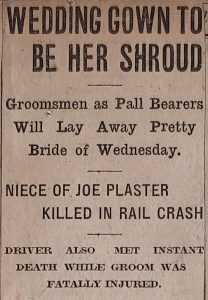
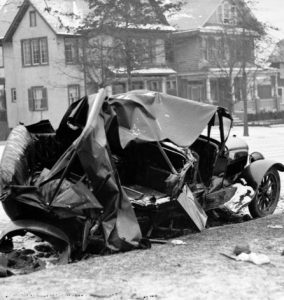 transporting the couple in a closed carriage. As the carriage began its crossing of the tracks of the Lake Erie and Western Railway, Grishaw failed for look for trains, and pulled out in front of the Lake Erie train going full speed. The train ripped through the car, and by the time the train could stop and the crew reached the car’s occupants, Ruth Schulenberg and Edward Grishaw were dead. Wilberd Youngman was critically injured, and not expected to live.
transporting the couple in a closed carriage. As the carriage began its crossing of the tracks of the Lake Erie and Western Railway, Grishaw failed for look for trains, and pulled out in front of the Lake Erie train going full speed. The train ripped through the car, and by the time the train could stop and the crew reached the car’s occupants, Ruth Schulenberg and Edward Grishaw were dead. Wilberd Youngman was critically injured, and not expected to live.
Amazingly, Wilberd Youngman did live…for eleven months. Youngman was taken to a hospital in Chicago, but his prognosis was grim. People just don’t come back from being hit by a train that ripped their car apart, and yet he was still alive, and actually recovering from his injuries…the visible injuries anyway. Youngman had lost so much that November day, and he was struggling to move forward. Ruth Schulenberg had been his soulmate, and his very best friend. She was the love of his life, and he knew there could never be another woman for him. Wilberd Youngman was not a man who would commit suicide, but he also could not recover from this deepest injury…the one that broke his heart. Slowly, over the eleven months that followed the saddest day of 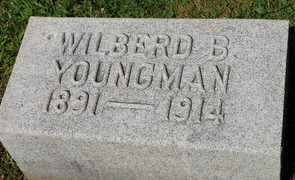 his life, Wilberd Youngman dwindled away. it wasn’t a refusal of food and water, but rather a refusal to go on without his precious Ruth. Finally, on October 24, 1914, just short of 11 months after that awful day…November 30, 1913, Wilberd Youngman could no longer go on living, and so, with his parents by his side, he simply passed away. The final cause of death was listed as a broken heart. That, to me was the saddest cause of death I had ever heard. Because of the loss of his wife, Wilberd simply had no desire to live either. He tried to recover…physically, but his heart was no longer in it, and he finally just gave up and quit trying. The Honeymoon Tragedy had finally claimed it’s last victim.
his life, Wilberd Youngman dwindled away. it wasn’t a refusal of food and water, but rather a refusal to go on without his precious Ruth. Finally, on October 24, 1914, just short of 11 months after that awful day…November 30, 1913, Wilberd Youngman could no longer go on living, and so, with his parents by his side, he simply passed away. The final cause of death was listed as a broken heart. That, to me was the saddest cause of death I had ever heard. Because of the loss of his wife, Wilberd simply had no desire to live either. He tried to recover…physically, but his heart was no longer in it, and he finally just gave up and quit trying. The Honeymoon Tragedy had finally claimed it’s last victim.
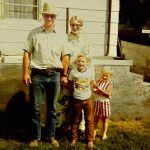 My husband, Bob’s Aunt Pearl Hein is a very ambitious person. For years, she has raised a garden, and canned tons of vegetables. She and Uncle Eddie have long been very busy people…maybe too busy sometimes. Pearl worked for many years at the IGA store in Forsyth, Montana, and pretty much became vital to the functioning of that place. That did make it hard for Pearl to entertain, and at least when we were in town, she always enjoyed having everyone come over for dinner. We didn’t get to Forsyth often, and she liked to make our visit very special. And she did make our visits special…not just because she is a great cook, but because she always made us feel welcome. Going to visit Eddie and Pearl was always a highlight of our visits to Forsyth.
My husband, Bob’s Aunt Pearl Hein is a very ambitious person. For years, she has raised a garden, and canned tons of vegetables. She and Uncle Eddie have long been very busy people…maybe too busy sometimes. Pearl worked for many years at the IGA store in Forsyth, Montana, and pretty much became vital to the functioning of that place. That did make it hard for Pearl to entertain, and at least when we were in town, she always enjoyed having everyone come over for dinner. We didn’t get to Forsyth often, and she liked to make our visit very special. And she did make our visits special…not just because she is a great cook, but because she always made us feel welcome. Going to visit Eddie and Pearl was always a highlight of our visits to Forsyth.
Pearl married Bob’s uncle Eddie on July 15, 1962, and they had two children, Larry Hein and Kimberly (Hein) Arani. They were then busily raising their family and spending time with siblings and parents. When Pearl’s parents needed help i their later years,she was right there to help them, often spending long hours at their homes. I remember many times that they were not able to take vacations because they were so busy. Now that they are both retired, they have more time to travel a little, and they have made a  couple of trips to Texas to visit their daughter, who lives there. I like that they can get away sometimes to a warmer climate, and I’m sure Kim likes it too.
couple of trips to Texas to visit their daughter, who lives there. I like that they can get away sometimes to a warmer climate, and I’m sure Kim likes it too.
Their son, Larry and his family still live in Forsyth, and for them as well as Eddie and Pearl, that will always be home. I’m not sure any of them will ever live anywhere else, and I can understand that. Forsyth is a cute little town, with a rich history. The family, from many branches, has roots there. While none of my own family were born there, Forsyth, and all of Bob’s family who are still there, will always hold a special place in my heart. And Pearl had a big part in those memories. Today is Pearl’s birthday. Happy birthday Pearl!! Have a great day!! We love you!!
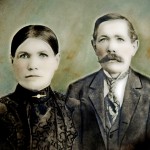 My great grandparents, Carl and Henriette (Hensel) Schumacher immigrated to the United States from Germany, in 1884 and 1882 respectively. It was an amazing time for them. The United States was a whole new world, and for those who came, the land of opportunity. By 1886, they were married and ready to start a family. My grandmother, Anna Schumacher was born in 1887, followed by siblings Albert, Mary (who died before she was 3), Mina, Fred, Bertha, and Elsa, who was born in 1902.
My great grandparents, Carl and Henriette (Hensel) Schumacher immigrated to the United States from Germany, in 1884 and 1882 respectively. It was an amazing time for them. The United States was a whole new world, and for those who came, the land of opportunity. By 1886, they were married and ready to start a family. My grandmother, Anna Schumacher was born in 1887, followed by siblings Albert, Mary (who died before she was 3), Mina, Fred, Bertha, and Elsa, who was born in 1902.
By 1914, World War I broke out, following the assassination of Franz Ferdinand. The government of the United States was understandably nervous about the German immigrants now living in in America. It didn’t matter that many of these people had been living in the united States for a long time, and some had become citizens, married, and had families. The government was still nervous, and I can understand how that could be, because we have the same problem these days with the Muslim nations. Still, when I think about the fact that these were my sweet, kind, and loving, totally Lutheran great grandparents, I find it hard to believe that anyone could be nervous about them. Apparently, I was right, because to my knowledge, they were never detained in any of the internment camps, nor were they even threatened with it.
Nevertheless, there were German nationals, and even naturalized citizens who faced possible detention during 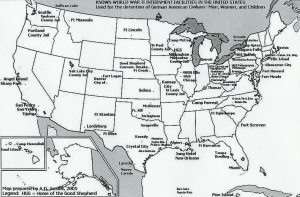 World War I and World War II. By World War II, President Franklin Delano Roosevelt declared Presidential Proclamation 2526, the legal basis for internment under the authority of the Alien and Sedition Acts. With the United States’ entry into World War I, the German nationals were automatically classified as “enemy aliens.” Two of the four main World War I-era internment camps were located in Hot Springs, North Carolina and Fort Oglethorpe, Georgia. Attorney General A. Mitchell Palmer wrote that “All aliens interned by the government are regarded as enemies, and their property is treated accordingly.”
World War I and World War II. By World War II, President Franklin Delano Roosevelt declared Presidential Proclamation 2526, the legal basis for internment under the authority of the Alien and Sedition Acts. With the United States’ entry into World War I, the German nationals were automatically classified as “enemy aliens.” Two of the four main World War I-era internment camps were located in Hot Springs, North Carolina and Fort Oglethorpe, Georgia. Attorney General A. Mitchell Palmer wrote that “All aliens interned by the government are regarded as enemies, and their property is treated accordingly.”
By the time of World War II, the United States had a large population of ethnic Germans. Among residents of the United States in 1940, more than 1.2 million persons had been born in Germany, 5 million had two native-German parents, and 6 million had one native-German parent. Many more had distant German ancestry. With that many people of German ancestry, it seems impossible that they could have detained all of them. Nevertheless, at least 11,000 ethnic Germans, overwhelmingly German nationals were detained during World War II in the United States. The government examined the cases of German nationals individually, and detained relatively few in internment camps run by the Department of Justice, as per its responsibilities under the Alien and Sedition Acts. To a much lesser extent, some ethnic German United States citizens were classified as suspect after due process and also detained. There were also a small proportion of Italian nationals 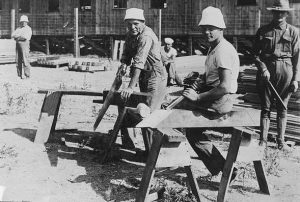 and Italian Americans who were interned in relation to their total population in the United States. The United States had allowed immigrants from both Germany and Italy to become naturalized citizens, which many had done by then. It was much less likely for those people to be detained, if they had already become citizens. In the early 21st century, Congress considered legislation to study treatment of European Americans during World War II, but it did not pass the House of Representatives. Activists and historians have identified certain injustices against these groups. I suppose that some injustices were done, but those were times of war and strong measures were needed.
and Italian Americans who were interned in relation to their total population in the United States. The United States had allowed immigrants from both Germany and Italy to become naturalized citizens, which many had done by then. It was much less likely for those people to be detained, if they had already become citizens. In the early 21st century, Congress considered legislation to study treatment of European Americans during World War II, but it did not pass the House of Representatives. Activists and historians have identified certain injustices against these groups. I suppose that some injustices were done, but those were times of war and strong measures were needed.

 Since becoming disabled, my son-in-law, Kevin Petersen has struggled to redefine himself. He can’t be on his feet for very long, and he can’t sit very long either. During the years since he was disabled, my daughter, Corrie Petersen, Kevin’s wife, has been pretty much single-handedly been taking care of him. Soon,it became apparent that Corrie needed a new carer. One that would be more fulfilling and one that would pay better. After much prayer, it was decided that Corrie would go back to school to become a nurse. They knew this was going to be a difficult road, that would become much harder when nursing school began. After 2 years of taking her prerequisites, Corrie started nursing school two weeks ago.
Since becoming disabled, my son-in-law, Kevin Petersen has struggled to redefine himself. He can’t be on his feet for very long, and he can’t sit very long either. During the years since he was disabled, my daughter, Corrie Petersen, Kevin’s wife, has been pretty much single-handedly been taking care of him. Soon,it became apparent that Corrie needed a new carer. One that would be more fulfilling and one that would pay better. After much prayer, it was decided that Corrie would go back to school to become a nurse. They knew this was going to be a difficult road, that would become much harder when nursing school began. After 2 years of taking her prerequisites, Corrie started nursing school two weeks ago.
Since August 20th, Kevin has reversed the roles. Now, while here are times Kevin need’s Corrie to be his caregiver, these days he is taking care of her. While Kevin must take frequent rest periods, he is cleaning the house, washing the laundry, and cooking the meals while Corrie is in school, at work, or studying. Each week of this stage of Corrie’s studies requires more work for her, and it isn’t going to get any easier until she graduates. Kevin wants to do his part. In many ways nursing school might have actually been harder for Corrie is Kevin was working, although I suppose he would be stronger too, if he wasn’t disabled. Needless to say, this process hasn’t been easy for Kevin either, and I am very proud of how he has stepped up to make this journey easier on Corrie.
When Kevin has some free time, he has been working on the Cyclone car his dad, Dean Petersen gave him a while back. He has also decided to try his hand at painting and drawing with different kinds of paint. Kevin has been dealing with tremors in his hands these days, so I’m sure painting and drawing is quite a challenge. During the times when Kevin has to lay down for a while, he has a companion who is very excited about those naps…their dog, Dottie. Dottie is a Scottish Terrier, and she totally loves Kevin. When Kevin needs to lay down, he tells Dottie they are going to take a nap. Dottie gets very excited. She is like a kid, except that she likes naps. She runs to the bedroom door and waits for Kevin to come. Then, Dottie settles herself on Corrie’s 
 pillow. It has become Dottie’s place when Corrie isn’t there. She loves napping with Kevin. When Dottie is outside, and Kevin has his shoes on, she won’t come in the house, because she thinks it’s time to go somewhere, and she doesn’t want to be left at home. She loves Kevin so much and she wants to be with him all the time. She is content to do what Kevin can do, and rest when he needs to, so it’s good for both of them. She is a great companion. Today is Kevin’s birthday. Happy birthday Kevin!! Have a great day!! We love you!!
pillow. It has become Dottie’s place when Corrie isn’t there. She loves napping with Kevin. When Dottie is outside, and Kevin has his shoes on, she won’t come in the house, because she thinks it’s time to go somewhere, and she doesn’t want to be left at home. She loves Kevin so much and she wants to be with him all the time. She is content to do what Kevin can do, and rest when he needs to, so it’s good for both of them. She is a great companion. Today is Kevin’s birthday. Happy birthday Kevin!! Have a great day!! We love you!!
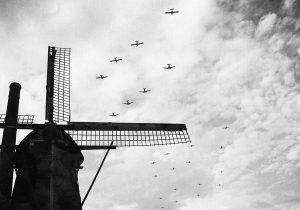 It has been 74 years since 17,740 Americans gave their lives to liberate the people of the Netherlands (often called Holland) from the Germans during World War II, and the people of Holland have never forgotten that sacrifice. For 74 years now, the people of the small village of Margraten, Netherlands have taken care of the graves of the lost at the Margraten American Cemetery. On Memorial Day, they come, every year, bringing Memorial Day bouquets for men and women they never knew, but whose 8,300 headstones the people of the Netherlands have adopted as their own. Of the 17,740 who were originally buried there, 9,440 were later moved to various paces in he United States by their families. “What would cause a nation recovering from losses and trauma of their own to adopt the sons and daughters of another nation?” asked Chotin, the only American descendant to speak on that Sunday 4 years ago. “And what would keep that commitment alive for all of these years, when the memory of that war has begun to fade? It is a unique occurrence in the history of civilization.”
It has been 74 years since 17,740 Americans gave their lives to liberate the people of the Netherlands (often called Holland) from the Germans during World War II, and the people of Holland have never forgotten that sacrifice. For 74 years now, the people of the small village of Margraten, Netherlands have taken care of the graves of the lost at the Margraten American Cemetery. On Memorial Day, they come, every year, bringing Memorial Day bouquets for men and women they never knew, but whose 8,300 headstones the people of the Netherlands have adopted as their own. Of the 17,740 who were originally buried there, 9,440 were later moved to various paces in he United States by their families. “What would cause a nation recovering from losses and trauma of their own to adopt the sons and daughters of another nation?” asked Chotin, the only American descendant to speak on that Sunday 4 years ago. “And what would keep that commitment alive for all of these years, when the memory of that war has begun to fade? It is a unique occurrence in the history of civilization.”
The people of Margraten immediately embraced the Americans, who had come to their aid when they needed it most. The town’s mayor invited the company’s commanders to sleep in his home, while the enlisted men slept in the schools. The protection against rain and buzz bombs was welcomed. Later, villagers hosted U.S. troops when the men were given rest-and-recuperation breaks from trying to breach the German frontier defenses, known as the Siegfried Line. “After four dark years of occupation, suddenly [the Dutch] people were free from the Nazis, and they could go back to their normal lives and enjoy all the freedoms they were used to. They knew they had to thank the American allies for that,” explained Frenk Lahaye, an associate at the cemetery.
By November 1944, two months after the village’s 1,500 residents had been freed from Nazi occupation by the U.S. 30th Infantry Division the town’s people were filled with gratitude, but the war wasn’t over. In late 1944 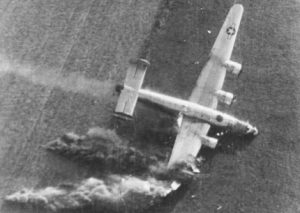 and early 1945, thousands of American soldiers would be killed in nearby battles trying to pierce the German defense lines. The area was filled with Booby-traps and heavy artillery fire. All that combined with a ferocious winter, dealt major setbacks to the Allies, who had already suffered losses trying to capture strategic Dutch bridges crossing into Germany during the ill-fated Operation Market Garden.
and early 1945, thousands of American soldiers would be killed in nearby battles trying to pierce the German defense lines. The area was filled with Booby-traps and heavy artillery fire. All that combined with a ferocious winter, dealt major setbacks to the Allies, who had already suffered losses trying to capture strategic Dutch bridges crossing into Germany during the ill-fated Operation Market Garden.
Now, the U.S. military needed a place to bury its fallen. The Americans ultimately picked a fruit orchard just outside Margraten. On the first day of digging, the sight of so many bodies made the men in the 611th Quartermaster Graves Registration Company ill. The bodies arrived in a procession of trucks and trailers. Death hung in the air over the whole village of Margraten. The sight of so much death caused a few of the people helping with the burials to become ill. They suddenly made a break for the latrines. The first burial at Margraten took place on November 10, 1944. Laid to rest in Plot A, Row 1, Grave 1: John David Singer Jr, a 25-year-old infantryman, whose remains would later be repatriated and buried in Denton, Maryland, about 72 miles east of Washington. Between late 1944 and spring 1945, up to 500 bodies arrived each day, so many that the mayor went door to door asking villagers for help with the digging. Over the next two years, about 17,740 American soldiers would be buried here, though the number of graves would shrink as thousands of families asked for their loved ones’ remains to be sent home, until 8,300 remained, and still, the graves are cared for by the town’s people, as if the dead were their own loved one. Not only that, but they have taken it upon themselves to research the deceased, and learn of their lives as a way of showing honor to these fallen heroes.
On May 29, 1945, the day before the cemetery’s first Memorial Day commemoration, 20 trucks from the 611th 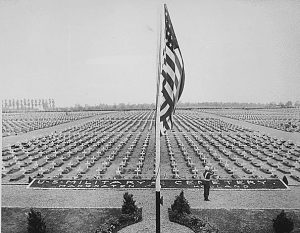 collected flowers from 60 different Dutch villages. Nearly 200 Dutch men, women and children spent all night arranging flowers and wreaths by the dirt-covered graves, which bore makeshift wooden crosses and Stars of David. By 8am, the road leading into Margraten was jammed with Dutch people coming on foot, bicycle, carriages, horseback and by car. Silent film footage shot that day shows some of the men wearing top hats as they carried wreaths. A nun and two young girls laid flowers at a grave, then prayed. Solemn-faced children watched as cannons blasted salutes. The Dutch, Shomon wrote, “were perceptibly stirred, wept in bowed reverence.” All they do for these heroes is because they have vowed never to forget.
collected flowers from 60 different Dutch villages. Nearly 200 Dutch men, women and children spent all night arranging flowers and wreaths by the dirt-covered graves, which bore makeshift wooden crosses and Stars of David. By 8am, the road leading into Margraten was jammed with Dutch people coming on foot, bicycle, carriages, horseback and by car. Silent film footage shot that day shows some of the men wearing top hats as they carried wreaths. A nun and two young girls laid flowers at a grave, then prayed. Solemn-faced children watched as cannons blasted salutes. The Dutch, Shomon wrote, “were perceptibly stirred, wept in bowed reverence.” All they do for these heroes is because they have vowed never to forget.
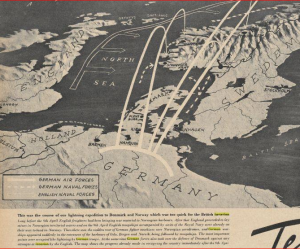 During World War II, it seems that there were a number of missed warnings about coming actions. Perhaps, if these warnings had been heeded, parts of the war, and indeed the length of it might have been different. One such event occurred when two German officers who were flying after consuming too much alcohol, became lost in the inky black night sky, when suddenly their plane began to nosedive. Maybe they thought, as their doomed plane plunged toward the ground, “Please let this be German soil we’re hurtling towards.” No matter what their thoughts were, they were definitely not headed for a crash landing in Germany, but rather they crashed in Holland.
During World War II, it seems that there were a number of missed warnings about coming actions. Perhaps, if these warnings had been heeded, parts of the war, and indeed the length of it might have been different. One such event occurred when two German officers who were flying after consuming too much alcohol, became lost in the inky black night sky, when suddenly their plane began to nosedive. Maybe they thought, as their doomed plane plunged toward the ground, “Please let this be German soil we’re hurtling towards.” No matter what their thoughts were, they were definitely not headed for a crash landing in Germany, but rather they crashed in Holland.
The crash landing in Holland was a big problem for the officers, because they were carrying battle plans for Hitler’s coming invasion of Holland. The plans, which involved exotic strategies like flamethrowers, and using gliders to silently deliver troops behind enemy lines, all seemed so unlikely that the 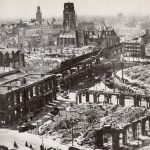 Dutch commanders refused to believe it. Just weeks later, it all unfolded exactly as the plan had foretold. Germany occupied Holland. It seems incredible but almost every daring German offensive was known well beforehand. Yet, in every case, those in power refused to see what was right in front of them. Hitler could have been stopped long before he was, if these botched early warnings had been taken seriously. In another such example, a German deserter was captured by the Russians. He gave up the plans to Hitler’s “Operation Barbarossa.” Yet, the Russian commanders found the 1,800 mile wide offensive too unlikely to believe. Then, just weeks later, they were caught off guard by the largest invasion in history.
Dutch commanders refused to believe it. Just weeks later, it all unfolded exactly as the plan had foretold. Germany occupied Holland. It seems incredible but almost every daring German offensive was known well beforehand. Yet, in every case, those in power refused to see what was right in front of them. Hitler could have been stopped long before he was, if these botched early warnings had been taken seriously. In another such example, a German deserter was captured by the Russians. He gave up the plans to Hitler’s “Operation Barbarossa.” Yet, the Russian commanders found the 1,800 mile wide offensive too unlikely to believe. Then, just weeks later, they were caught off guard by the largest invasion in history.
But, perhaps the most chilling warning of all came far earlier: before the war had even started. The warning came from an analyst dispatched to Hitler’s Germany in 1938. In 1939 he delivered a sobering prediction: the worst conflict in history was about to begin. He reported: “War is coming to Europe, but not until September at the earliest.” On September 1, 1939, Hitler launched his attack on Poland. World 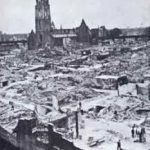 War II had begun. That analyst belonged to a group that soon became part of the largest underground news and research network in the world. One that would go on to predict large world shifts with shocking accuracy: As early as 1987, this network predicted the fall of the Soviet Union. In 1989, they called the crash of the Japanese “miracle.” In the early 90s, they spoke out about the threat of radical Islamic terrorism. In the mid 2000s, they predicted the 2008 financial meltdown. They also predicted Donald Trump’s improbable win in the 2016 Presidential race, which in my opinion was their best prediction. Sadly, this underground news and research group, was not taken seriously in the warnings they gave, and the world paid the consequences for those missed warnings.
War II had begun. That analyst belonged to a group that soon became part of the largest underground news and research network in the world. One that would go on to predict large world shifts with shocking accuracy: As early as 1987, this network predicted the fall of the Soviet Union. In 1989, they called the crash of the Japanese “miracle.” In the early 90s, they spoke out about the threat of radical Islamic terrorism. In the mid 2000s, they predicted the 2008 financial meltdown. They also predicted Donald Trump’s improbable win in the 2016 Presidential race, which in my opinion was their best prediction. Sadly, this underground news and research group, was not taken seriously in the warnings they gave, and the world paid the consequences for those missed warnings.

